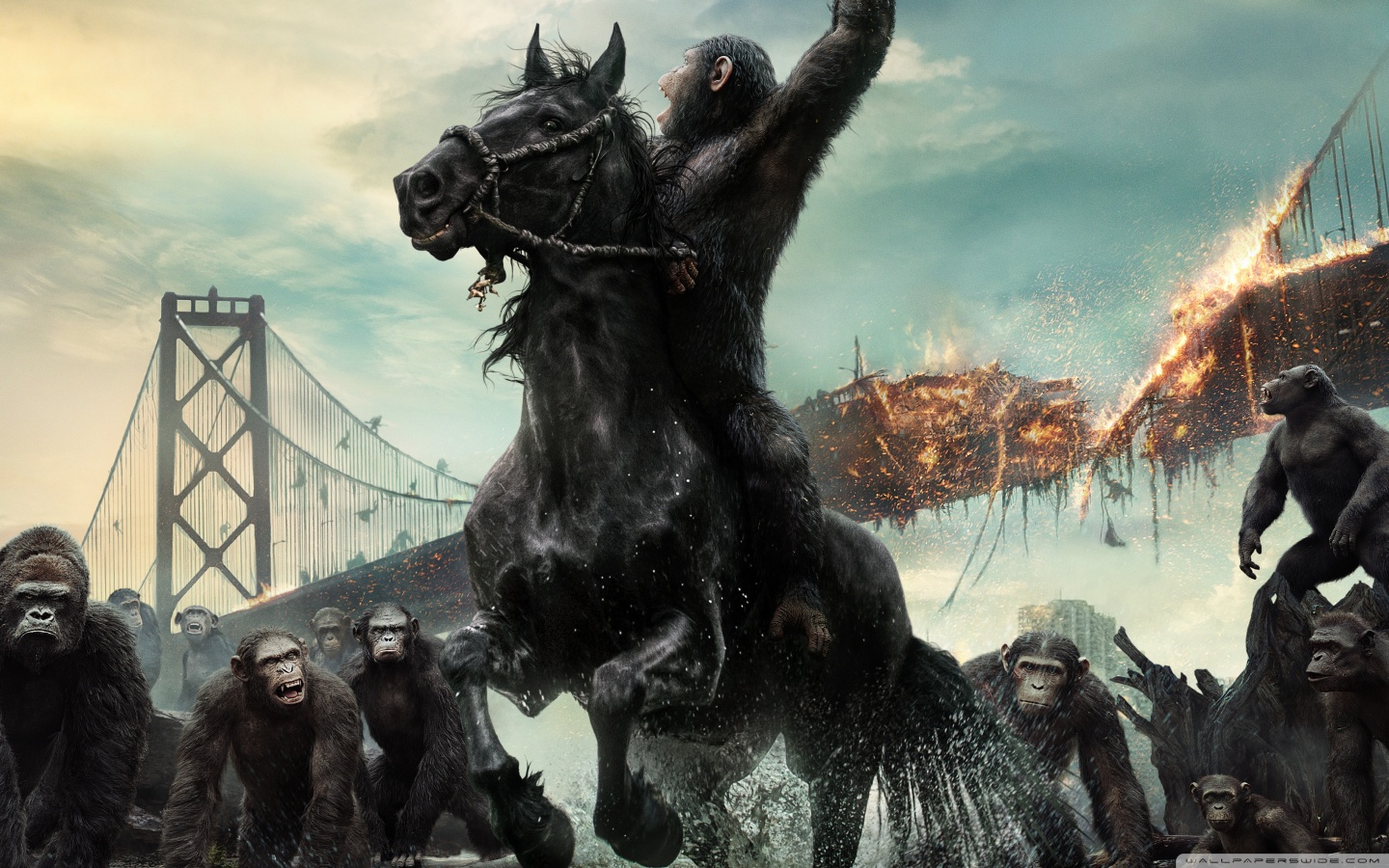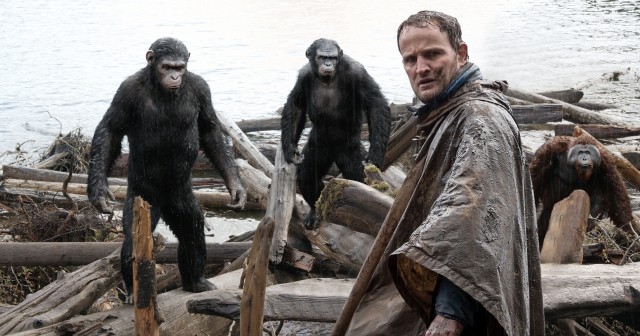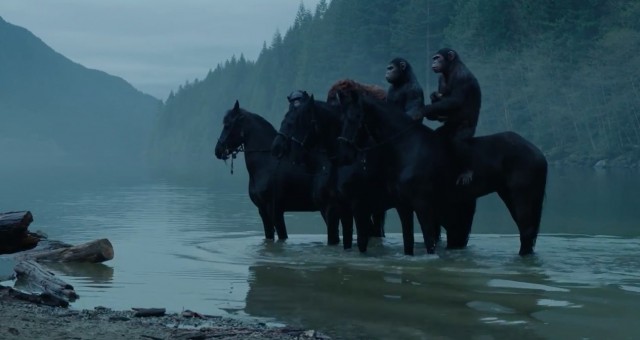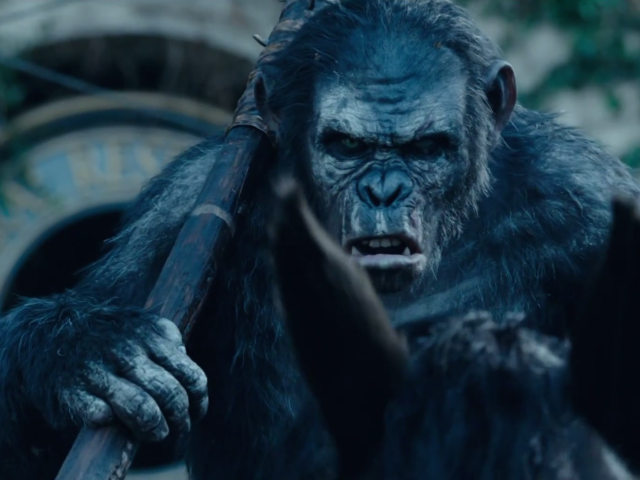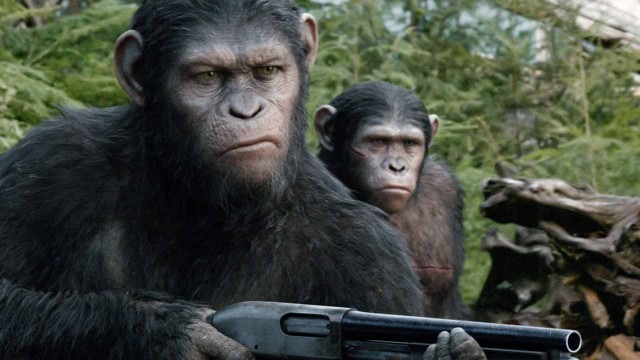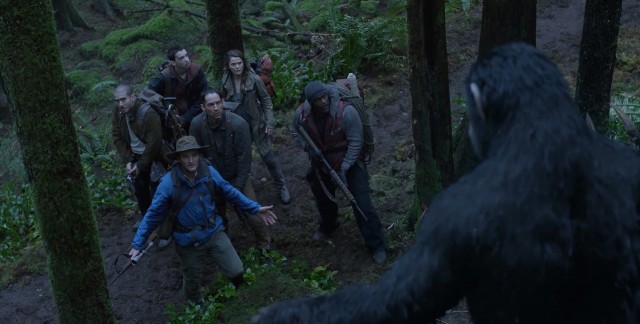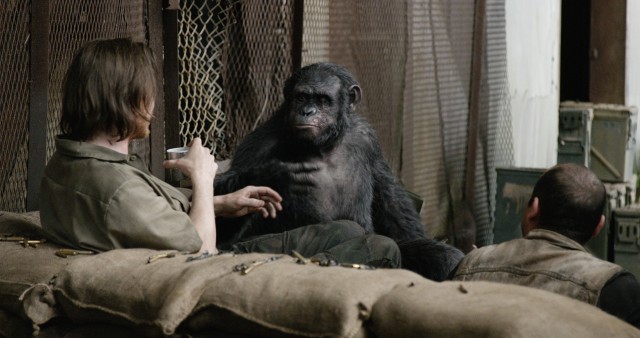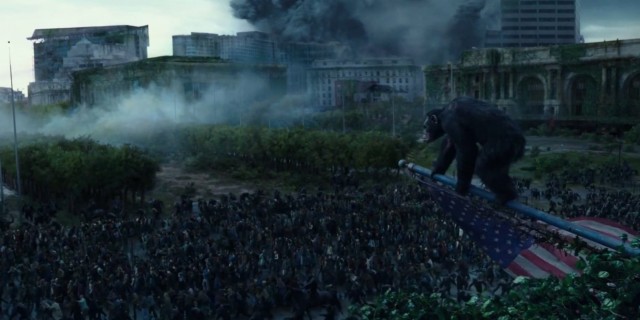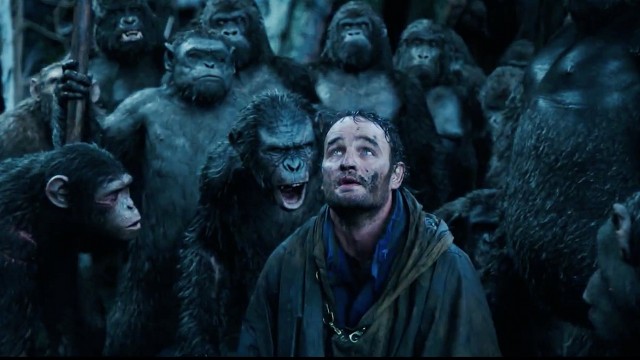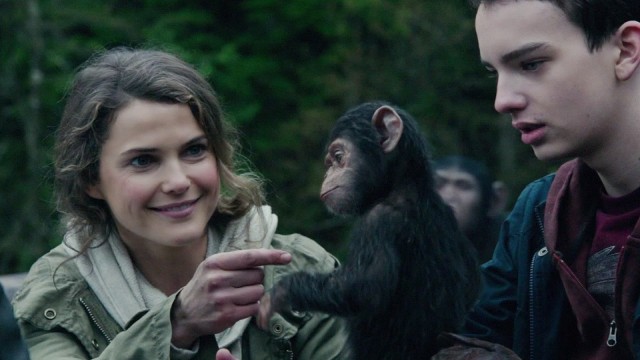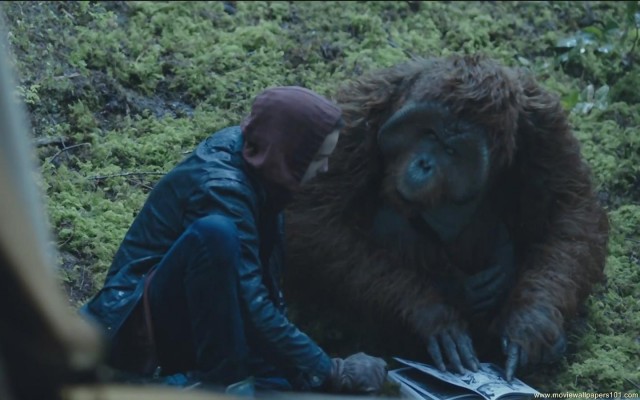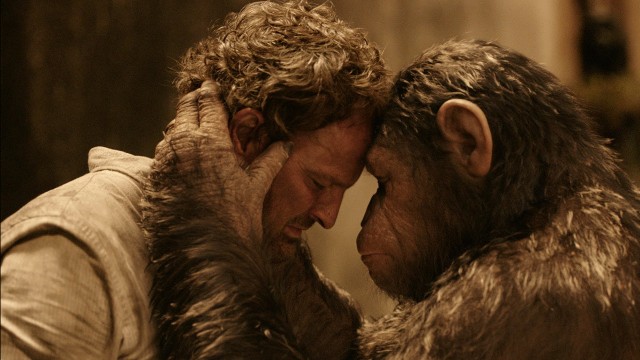2011’s Rise of the Planet of the Apes was a fashionably late Summer surprise that had the interesting distinction of motivating moviegoers to root against their own species. Both a prequel and a reboot to the beloved Planet of the Apes movie series, Rise of the Planet of the Apes presented a more grounded and heartfelt take on the franchise, with the perspectives flipped so that we now saw the world through the eyes of the apes, rather than the humans.
Thanks to the wonderful talents of Andy Serkis in the lead role of future ape champion, Caesar most notably, Rise of the Planet of the Apes went on to become one of 2011’s best movies overall, let alone one of the best of that Summer. It was already a tough act to follow for a sequel, but amazingly, Dawn of the Planet of the Apes somehow manages to be even better than its already superb predecessor!
With humanity now mostly decimated and the apes rising to power, Dawn of the Planet of the Apes is now able to take the ideas behind Rise of the Planet of the Apes and expand upon them with even more drama and complexity. Rather than a simple flipped perspective, the sequel gives us a very effective look at the moral greys of both the humans and the apes, both just trying to eke out a living, and both tormented by their distrust of one another.
It’s hard to believe that this was once such a ludicrous franchise, considering the incredible amount of heart and poignant tragedy throughout Dawn of the Planet of the Apes. Regardless however, this latest offering brings the rebooted series to incredible new heights, and is definitely one of the top must-see blockbusters of the 2014 Summer season!
With the cast of Rise of the Planet of the Apes all succumbing to the deadly Simian Flu, we’re now simply left with our original ape protagonist, Caesar, now the leader of a small village of smart apes that underwent the same experimentation as him. Under Caesar’s rule, the peaceful community has enacted law, education, and stable means to live and grow.
Of course, this changes when the apes inadvertently run into a group of humans, who are struggling far more significantly. The human settlement is being threatened with a power shortage, which forces the people to try and negotiate for the apes’ territory.
Naturally, this sows all sorts of distrust between Caesar’s own apes, though Caesar himself desires to be diplomatic. After allowing the humans onto the apes’ turf, a series of events thus unfolds that serves as the plot of the movie, specifically the unfortunate result of these two species being doomed to conflict and hatred.
It would have been easy to simply make the apes and humans fight in a big, flashy climax that the movie spent its entirety building up to, but surprisingly, Dawn of the Planet of the Apes doesn’t go for the low-hanging fruit. Instead, it tries to present characters that are deeper and have proper, complex motivations. Villains are not simply villains for the sake of being villains. They have suffered and lost and had their trust betrayed in the past, leading to them becoming uncompromising survivors in an increasingly harsh world.
Caesar meanwhile is called into scrutiny by some of his followers, since he trusts the humans in the first place. Then again, given that Caesar has seen that humans are capable of both great evil and great good, considering Caesar’s upbringing in a home of humans, this allows him to be neutral and seek reason over rash action.
As with the previous movie, it’s Caesar that makes up a large part of why Dawn of the Planet of the Apes is as excellent as it is too. It would have been easy to just have Caesar eventually throw up his hands and declare that all of the humans have to die, but the movie doesn’t do this. Caesar wants peace, not war. Caesar wants what is best for his people, and he will defend his people, but not at the cost of the principles that he started his settlement under in the first place.
Once again, this can sometimes make the apes feel even more human than the actual humans in Dawn of the Planet of the Apes. One of the movie’s highlight scenes has Caesar return to the place where he was raised in Rise of the Planet of the Apes, and without a spoken word, we see exactly what happened to the lead cast of the first movie, and how this has affected Caesar. We see all of the heartbreak and regret on his face. We see the sorrow behind Caesar being unable to stop the fate of his human companions, and being forced to abandon them, a theme that echoes in the inevitable war between the humans and apes that looms ever present on the horizon.
On the humans’ side, we have a new band of ambassadors in the form of Malcolm and Ellie, played by Jason Clarke and Keri Russell respectively. Like Caesar, Malcolm and Ellie don’t want war, and believe that they can co-exist with the apes. Seeing the two learn under and work with Caesar gives audiences a faint glimmer of hope that maybe the two species won’t necessarily be doomed to conflict.
Alas however, it’s not meant to be. Back at the human settlement, human leader, Dreyfus, played by Gary Oldman, believes that the apes should be treated as animals that need to be pushed out of their territory and have their land taken. Meanwhile, Caesar’s companion, Koba, portrayed in motion-capture by Toby Kebbell, believes that there is no good in humans, and that they must be exterminated. Even with just this one spark on both sides, the two sides’ diplomacy crumbles, and the war we all knew was coming eventually erupts.
Despite this however, we don’t root for one side or the other this time. Instead, audiences will no doubt just feel sad. Sure, the movie is still packed with great action during its more exciting scenes, but as much as audiences may come to see an action-packed battle to start, it won’t be long before Caesar and his human friends sour you to the idea of needless war. You know that peace won’t last, but you cling to the hope that maybe there’s a better way.
In this sense, Dawn of the Planet of the Apes becomes a very transcendent Summer blockbuster thanks to its characters. Like Rise of the Planet of the Apes having the rare distinction of making the humans in the audience cheer for their own defeat, Dawn of the Planet of the Apes has the rare distinction of being a blockbuster where you don’t savour the action and violence. Instead, it’s a blockbuster that somehow successfully makes you want to avoid a battle as much as Caesar does.
This really ties back to Caesar being the fantastic heart and soul behind these superb new prequel/reboot stories. Audiences will easily see every perspective of Caesar’s journey, and will echo Caesar’s own emotions throughout proceedings, right down to the continued dismay that peace with the humans just seems to keep slipping through Caesar’s fingers.
With the humans and apes both forced into each other’s vicinity, Dawn of the Planet of the Apes immediately presents a more interesting and grey conflict that makes for an even deeper and more satisfying blockbuster than its predecessor, as well as a more tragic one. Even then however, by the heartbreaking conclusion of Dawn of the Planet of the Apes, you’ll still get the sense that the story is only going to get better from here.
In any case, the movie takes place in 2016, around five years after the events of Rise of the Planet of the Apes, with a montage showing how the lethal Simian Flu teased in the first movie has now wiped out most of humanity and collapsed society. Now, only a handful of survivors with genetic immunity to Simian Flu remain across the world, with humans struggling to thrive in the post-apocalyptic world as the apes flourish.
With the remaining humans faced with running out of resources in the now-ruined San Francisco, an accidental encounter leads to a party of humans discovering the genetically-enhanced apes under Caesar’s rule, and needless to say, they don’t get off on the right foot. Tensions immediately run high as Caesar must display his intelligence and ability to speak to the human settlement, warning them never to trespass in ape territory again.
With the humans desperate however, survivors, Malcolm and Ellie, along with Malcom’s son, Alexander, are forced to try and negotiate with the apes for use of their land, so they can try and jumpstart a hydroelectric dam to keep their settlement powered. Caesar agrees, and it’s from here that we see the potential for what could have been; A peaceful society shared between apes and humans, where the two learn and grow together.
Again, watching this light of hope crumble under the inevitable shadow of war is something that will break audiences’ hearts in a way that few blockbusters can. It may still be easy to enjoy the cooler moments of action in the movie, but it’s inevitable that audiences will lament what was lost in the process.
Action that makes you think, but is nonetheless thrilling is perhaps one of the best surprising byproducts of a story that is already remarkably deep and emotionally challenging. Thus, Dawn of the Planet of the Apes perfectly bridges the gap between blockbuster spectacle and stirring drama, telling what is arguably the best tale that the franchise has yet seen in the process!
Dawn of the Planet of the Apes has seen a change in directors from Rupert Wyatt to Let Me In’s Matt Reeves, making for a movie that is noticeably different in presentation from its predecessor.
Despite this change however, Reeves makes Dawn of the Planet of the Apes an even more satisfying and memorable movie than its predecessor, crafting a complex piece that is as interesting and cool as it is grim and heartbreaking. He works incredibly well with Andy Serkis in the role of Caesar, once again beautifully bringing audiences along on Caesar’s trying quest for peace for the apes, and through Caesar’s eyes, creates a world of harsh survival with no clear answers.
As much as Reeves perfectly realizes every emotional scene however, he still directs the action just as effectively. The scenes where the apes and humans battle it out feel fast-paced, tense and even vaguely horrifying. There’s a lot of over-stimulation and noise, but it makes sense, considering that the ambushes of the two factions cause a lot of chaos in what’s otherwise a very quiet and almost strangely peaceful post-apocalyptic world, at least, until war inevitably erupts.
Even if it feels like a very different film from Rise of the Planet of the Apes, Dawn of the Planet of the Apes nonetheless takes the emotional strengths of its predecessor, and continues to build on them in a new world, with a new conflict, though one that echoes the foundation of its predecessor. Even not having worked on the previous movie, Reeves nonetheless does a stellar directing job when it comes to building an even better sequel, one that feels both bigger and deeper.
Given Matt Reeves previously collaborating with Dawn of the Planet of the Apes soundtrack composer, Michael Giacchino on Let Me In, it’s a bit unsurprising that Dawn of the Planet of the Apes almost has a soundtrack ripped straight from a horror movie.
Many of the soundtrack’s tunes are creepy and consistently ominous, often emphasizing subtlety above all else. It’s a very unusual blockbuster score that is surprisingly light on action-packed tunes, but one that nonetheless works. It very effectively demonstrates the inevitable threat of war between humans and apes, and the continued distrust that most members of both species share between each other.
Of course, there are a handful of action tunes as well, with a highlight piece playing during the initial battle between the apes and humans, and pushing nearly ten minutes long! Again, the sound is intense, but in a sort of scary, horrifying way. It’s a tune that effectively complements audiences no doubt not wanting the humans and apes to fight.
All in all, this is a very strong soundtrack, even if it probably isn’t what you would expect. Its soundtrack CD is one that avid Planet of the Apes fans may actually wish to pick up!
Once again, a movie that’s otherwise light on effects really comes into its own with the ape characters, and particularly Caesar. Like in Rise of the Planet of the Apes, audiences will quickly forget that Caesar is an effect, since he feels like such a real, grounded character.
In Dawn of the Planet of the Apes, this success is multiplied all the more, since Caesar has now grown and developed an entire ape colony, complete with a mate and two sons. All of them feel like actual characters, with actual personalities, and seeing them interact with the humans feels surprisingly natural, and even downright chilling in many scenes.
With most of humanity wiped out, Dawn of the Planet of the Apes is now also allowed to have more ambitious set work as well. Nature has overtaken a large part of the human development in San Francisco. Much of the area is now full of lush greenery and teeming wildlife. It makes for a world that really does seem better without the humans in it.
For all of the superb work that’s gone into realizing the visuals of Dawn of the Planet of the Apes then, it’s a tad disappointing that the 3D presentation is the one weak link. To be fair, the 3D is acceptable, adding some degree of heightened atmosphere to the movie, but it’s still far from necessary. If you like 3D movies, the 3D is good enough to tolerate, but if you’d rather just watch the movie flat in 2D, you’re really not missing anything.
Regardless however, Dawn of the Planet of the Apes has really contributed to giving these rebooted prequel stories a more palpable sense of style, and this second movie has more effectively separated itself from other movies compared to its predecessor.
Dawn of the Planet of the Apes is an absolutely excellent Summer blockbuster that demands to be seen on the big screen this year. Rise of the Planet of the Apes is already a great movie, but Dawn of the Planet of the Apes feels like something genuinely bigger and better than its predecessor, in all the right ways.
Andy Serkis has continued to realize one of the most emotional and tragic protagonists in any blockbuster of recent memory thanks to his wonderful portrayal of Caesar, and even with a huge shake-up in cast and a director switch from the first movie, Dawn of the Planet of the Apes uses the building blocks of its predecessor to construct a story that both pushes the franchise forward, and teases even more promise to come.
Even better is the fact that Dawn of the Planet of the Apes doesn’t present a clear-cut answer to its overarching conflict and inevitable battle between human and ape. There are no heroes or villains. There is no right or wrong. There is only the struggle to survive. This leads to a blockbuster that still feels slickly-produced and thrilling, but strikes an emotional and thought-provoking chord that few Summer blockbusters ever effectively manage to do to this degree.
Once again, Dawn of the Planet of the Apes is not just a contender for this year’s top Summer blockbuster, but one of 2014’s best movies overall. Apes, together, strong indeed.

